人教版 高中英语必修2unit1 Reading and writing 读写课教案
人教版高中英语选择性必修二 Unit 1 第五课时 Reading and writing

makes a great scientist.
图片来源于网络
1. Discuss some important qualities for great scientists;
2. Support your opinion with concrete events from the
lives of scientists;
Pre-writing
2
How can you convince the readers of the importance of the qualities you choose for great scientists?
Writing tip: 借事记人
Support your opinion with concrete events from the lives of scientists;
Example quality: being patren switched his major and returned to China
quality: a questioning mind
event: John Snow drew a map to examine the cause of cholera
a questioning mind
Pre-reading
Why was Qian called “the father of China’s aerospace”?
Reading
Why was Qian called “the father of China’s aerospace”?
studied Railway Mechanical Engineering
switched major to aviation
UNIT1CULTURALHERITAGEREADINGANDWRITING(教学课件)高中英语人教
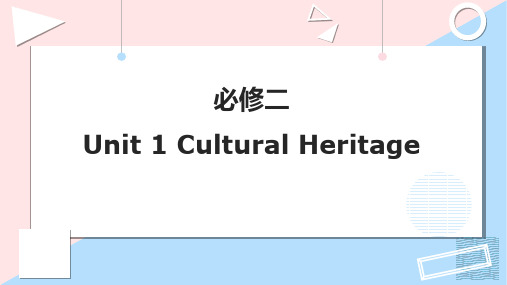
When the project ended in 1980, it was considered a great success. Not only had the countries found a path to the future that did not run over the relics of the past, but they had also learnt that it was possible for countries to work together to build a better tomorrow.
success.
1980年该项目完工时,被视为一个巨大的成功。
社会进步需要经济发展。新旧更替的时代已经到来,在走向 未来的过程中,我们不可能将过去的一切都保存下来。在发 展与文化遗址保护之间找到恰当的平衡点,并加以保持,这 可能是一项巨大的挑战。
Not only had the countries found a path to the future that that引导的定从,修饰path,关系词在从句中作主语
委员会成立了,目的是减少对埃及建筑物的破坏,并防止文物损失。
请求
捐款,贡献
部门
筹集 资金
社区,社会
该委员会请求各个部门捐款,并在国际社会内筹集资金。
调查
实施
Experts investigated the issue, conducted several tests, and
社会进步需要经济发展。新旧更替的时代已经到来,在走向 未来的过程中,我们不可到恰当的平衡点,并加以保持,这 可能是一项巨大的挑战。
that 引导的定从,修饰scientists,关系词在从句中作主语
Unit 1 Reading for Writing 课件-高一英语人教版(2019)必修第二册
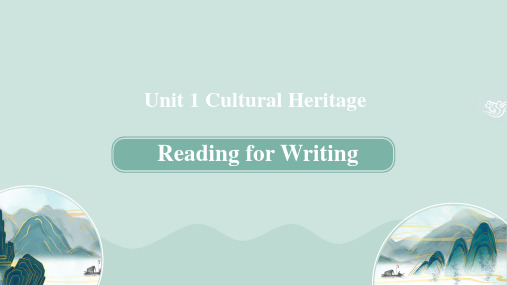
2. Why are so many people interested in the Mogao Caves?
3.What do you think of the researcher's opinion in the last paragraph?
Review
新闻报道是记叙文的一种,其特点是以事实为依据, 对人的经历或事实给予明确的、实事求是的报道。
A. Lead sentence (导语) B. Direct quote (直接引用语) C. Paraphrase (解释) D. Background information (背景信息) E. Reporting verbs (引述动词) F. Words to show comparison and/or contrast
what
Underline the relative clauses that the writer uses to identify the following.
things people time
things
Relative clauses makes the expression briefer and informative.
This activity was surely a great success. It not only aroused more students' interest in protecting the Great Wall ,but also made more people realize the importance of protecting other cultural relics.
success. It not only...but also ...
新人教高中英语必修二Unit1CulturalHeritageReadingforwriting课件
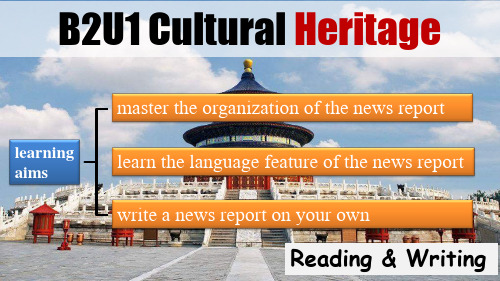
1. Can you find words or expressions to show comparison?
are just as international as they were at the time when ...
2. How are the Mogao Caves today? Are they still popular? How?
B2U1 Cultural Heritage
learning aims
master the organization of the news report learn the language feature of the news report write a news report on your own
background information
The Mogao Caves have long been a meeting point for different cultures and are part of the history of many countries. Toadsa..y.a,st.h.像e…c一aves are just as international as they were at the time when people travelled样th(e原S级i比lk较R)oad. Tourists from all over the world visit Dunhuang to see the caves, and the Getty Museum in Los Angeles has even reproduced a copy of the caves and paintings for people to admire in America.
Unit 1 Reading and thinking(课件)高中英语人教版(2019)选择性必修二
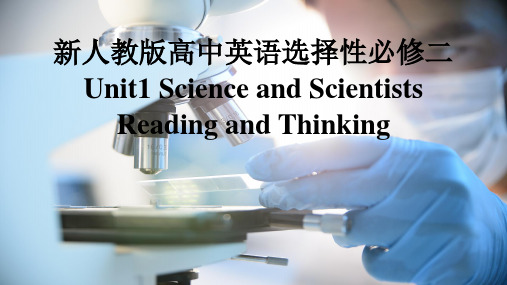
Para. 3
Snow's contributions.
Para. 4
John Snow desired to destroy cholera.
Para. 5
Truth of the infection of cholera.
Activity 3 careful-reading 1.Which of the following did John Snow believe in?
1. What are the two theories? Which theory did John Snow think was reasonable? 2. What did John Snow investigate when another outbreak hit London in 1854?
Who ? How ? What ? The text is mainly about __J_o_h_n__S_n_o_w__ and __h_o_w___ he defeated king cholera.
scientific research
Stages of Scientific Research
While reading
Activity 1: Read the whole text quickly and match the main idea
Para. 1
Snow began his study by marking on the map.
Para. 2
John Snow decided to prove the second theory.
Besides coronavirus, what other kinds of epidemics (流行病)do you konw?
Unit 1 Reading and Thinking》教学课件【高中英语选择性必修第二册人教版】
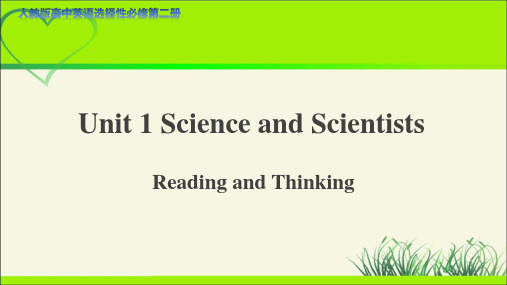
Listen to get the main idea of each paragraph.
outbreak
theories
process
truth/reason
contributions
While-reading
Unit 1 Science and Scientists
Reading and Thinking
Warming-up
Look at the picture and discuss the following questions.
1) How would you describe the photo?2) What scientific equipment can you see in a science laboratory?3) Would you like to work in such a field in the future? Why or why not?4) What qualities do you need to be a scientist?
Imagination is more important than knowledge. —Albert Einstein
Nothing in life is to be feared. It is only to be understood. —Marie Curie
The process of the research about cholera
The truth/reason for getting cholera
Snow’s contributions to preventing cholera
2020新教材人教版英语必修第二册同步提升练习:Unit 1 Reading for Writing含答案

Unit 1 Reading for Writing1、From early times, man has been interested in art. People have often worked together to collect and save the world's art treasures. Fine art treasures from many countries are kept in an art museum called the Louvre in Paris, France. The works of art have been collected by the people of France over many centuries. It is one of the biggest art museums in the world.The Louvre has not always been a museum. The first building was a fort(堡垒). In 1190, it was the king's castle with high walls and a round tower. It had a moat(护城河) to keep out the enemies. Over the years, the number of buildings around the castle grew. By 1350, the castle no longer needed a fort. The Louvre became a palace home for French kings and queens.During time of peace, new treasures were brought in. During the days of war, many treasures were stolen, and the buildings were damaged.When Francis I became king of France in 1515, he brought in many artists from other countries. One of the artists was Leonardo da Vinci from Italy. Da Vinci’s Mona Lisa is the best known painting in the museum today.In 1793, the Louvre became a public museum. It is a place where art treasures are kept for everyone to enjoy. Every year millions of people from all over the world come to the Louvre to see the masterpieces.1.Most of works of art in the Louvre have been collected probably by _______.A. the French peopleB. Francis IC. Leonardo da VinciD. people of the world2.Which of the following is NOT mentioned in the passage?A.Leonardo da Vinci once stayed in France.B.Mona Lisa is kept in the Louvre.C.The Louvre was once a church.D.The Louvre is a place of interest to different people from all over the world.3.Why is it good for the works of art to be kept in public museums?A.The works of art will not be stolen.B.The works of art will not be damaged.C.Artists can study the works of art.D.Everyone has a chance to enjoy the works of art.4.According to the passage, which of the following statements is TRUE?A.Louvre is always a museum since it was built.B.All the art treasures in the Louvre have been destroyed in the war.C.Louvre was once the king's castle in history.D.There is still a fort near the Louvre now.2、If it had not been for Fan Jinshi and her team,the world cultural heritage at Dunhuang Mogao Grottoes in a remote Chinese desert might have long been destroyed by sand, weather or humans.Born and raised in Shanghai, Fan has spent half a century fighting an uphill battle to preserve the ancient Buddhist wall painting at Dunhuang, in Northwest China s Gansu Province. The1,651-year-old Dunhuang Mogao Grottoes are a huge collection of Buddhist art—more than 2,000 buddha figures and 45,000 square meters of paintings spread among 735 caves. It is China's first UNESCO World Heritage Site.Archaeologist Fan was sent to Dunhuang after graduation from Peking University in 1963. While in Dunhuang, a remote village in the desert then, Fan lived in an abandoned temple. At firsts she did not even dare to go out to the toilet at night. To protect the treasures from sand and dampness, Fan and other workers put doors on the caves, planted trees and started monitoring temperature and humidity in the caves. They also controlled the number of visitors.In the late 1990s, with tourism booming nationwide since national holidays were extended, the local government planned to go public with Dunhuang Mogao Grottoes, but found Fan firmly in their way. "The heritage would have been destroyed if it had been listed," she said.Dunhuang Academy has now photographed and cataloged online all the sculptures and paintings. "Despite our efforts to minimize damage, we can't completely stop them from being eroded. But the digital database will last."Fan was grateful when her husband joined her in Dunhuang in 1986 after 19 years of separation. Her two sons grew up in Shanghai with their aunt. "I have not been a good mother orwife. With regard to my family, I'm full of guilt," she said. Fan, 79, retired two years ago as the director of Dunhuang Academy but continues her efforts as a national political adviser.1.Which of the following measures didn't Fan Jinshi take to protect Dunhuang Mogao Grottoes?A.Opening Dunhuang Mogao Grottoes to the public extensively.B.Planting trees and stopping the Dunhuang Mogao Grottoes being eroded.C.Picturing and classifying all the sculptures and paintings online.D.Putting doors on the caves and monitoring temperature and humidity.2.When was Fan separated from her husband?A. In 1963.B. In 1967.C. In 1986.D. In the late 1990s.3.The phrase "in their way" in Paragraph 4 means _______.A.Go to a place.B.Be in favor of something.C.Reject something.D.Give in to something.4.What kind of person do you think Fan is?A.Considerate and easy-going.B.kind and intelligent.C.Humorous and sweet-tempered.D.Devoted and persistent.3、You will meet many people in school, in college and at work. They'll try to have nicer cars, bigger houses, nicer clothes, and so on. To them, life is a 1._______(compete)—they have to do 2._______(good) than their peers(同龄人) to be happy.Here's a secret: Life isn't a competition. It's a journey. If you spend it always 3._______(try) to impress others, you're wasting your life. Instead, learn to enjoy the journey. Make it a journeyof happiness, of continual improvement,and filled with love.Don't worry 4._______ having a nicer car or house or anything material, or even 5._______ better-paying job. None of them matters, and none of them will make you happier. You'll acquirethese 6._______(thing) and then only want more. Instead, learn to be 7._______(satisfy) with having enough and then use the time 8._______ would have been wasted to try to earn money to buy those things.Find your passion, and go after it 9._______(constant). Don't work for only paying the bills. Life is too short 10._______(waste) on the job you hate.4、假定你是李华,你们学校英语俱乐部计划排练一部英文短剧以参加下个月的英语戏剧节。
高中英语人教版(2019)必修二Unit 1 Reading and Thinking课件

Unit 1 Cultural Heritage
Step 3: Careful reading tasks
Read more carefully and answer the following questions. 5. Before the building of the dam, what problems did the Nile river bring to the Egyptians? ➢Floods and droughts; not enough electricity.
Unit 1 Cultural Heritage
Step 2: Fast reading tasks
• Task of the second fast reading 1. Why did the Egyptian government want to build a new dam in the 1950s? 2. Why did the building of the dam lead to protests? 3. How did the government save the cultural relics? 4. Which one can describe the project? A. Successful. B. Negative. C. Useless. D. Doubtful. 5. What can be learned from the Aswan Dam project?
Unit 1 Cultural Heritage
Title: From Problems to Solutions
翻译:从问题重重到迎刃而解 • The text is about some problems about
- 1、下载文档前请自行甄别文档内容的完整性,平台不提供额外的编辑、内容补充、找答案等附加服务。
- 2、"仅部分预览"的文档,不可在线预览部分如存在完整性等问题,可反馈申请退款(可完整预览的文档不适用该条件!)。
- 3、如文档侵犯您的权益,请联系客服反馈,我们会尽快为您处理(人工客服工作时间:9:00-18:30)。
Reading and WritingTeaching content: 人教版高中英语必修2I.Teaching objectives:After learning this lesson, students will be able to1. Learn how to have a debate and write a debate report.2. Understand the law on the protection of cultural relics.II.Important and difficult points:1. Important point: Master the way to express own ideas.2. Difficult point: Debate logically.III.Teaching aids: Blackboard and PPT.IV.Teaching methods: Task-based methodV.Teaching procedures:Step 1. Reading (15min)First let students read the letter and find out the writer’s opinion about what should be done with the cultural relic that has been found.T: Who is the writer?S1: A student at a high school in Berlin.T: What’s his opinion? Where can you find it?S2: The last sentence in the letter: So I think that those who find Amber Room should decide what do to with it.T: What’s his reason for that?S2: His reason is that the search has cost the hunters a lot of time and money.T: By the way, what does “think highly of” in the first line mean?S3: It means to admire or respect someone or something.think highly / much / well of…=sing high praise for…think little / nothing of…e.g.The headmaster thought highly of me for my good performance.e.g.The little boy was well thought of by them.He thought nothing of walking 40 miles.走40英里, 他不当回事。
T: Do you agree with Johann? Now discuss the questions on the right side of the letter. Think of some reasons for your ideas.S1: I must say that I agree with Johann Weber. If you find something, it should belong to you because you are the person who found it. People need to understand that when they lose something, they lose the right to own it.S2:I must say that I don’t agree with you. Though you find something, it doesn’t mean it belongs to you. If you can find out who it belong to, you should try to return it. I’m sure you would want someone to do the same for you. If you really can not find the owner, try to donate the thing to charities to help the poor. With these help, maybe they can build some schools, and their children can go to school, and they have money to enjoy medicine care and so on. Remember when you are helping others; you are in fact helping yourself. Good cause, good effect.S3: Any cultural relics lost should not belong to the person or the country that finds it. The finder has no right to deal with it at will. Instead he should spare no efforts to protect it from being damaged. It’s the responsibility and d uty of the finder to send it back to its owner. The fact should be aware of that, in a way, cultural relics don’t belong to a single man; it belongs to the whole world and the human beings.Step 2. Debating (21min)Before T should assign Ss with different characters and explain the rules, and tell them the law of the People's Republic of China on the Protection of Cultural Relics:(1)Hiding cultural relics discovered underground, in inland waters, in territorial seas or in other places and failing to report and deliver them to the state, for which the persons involved shall be warned or fined by a public security department and the cultural relics illegally acquired by them shall be recovered;(2)Buying or selling cultural relics without the approval of the departments for cultural administration, for which the persons involved shall be warned or fined by the departments for the administration of industry and commerce, and their illegal earnings and the cultural relics illegally handled by them may be confiscated; or(3)Selling cultural relics in private collections to foreigners without permission, for which the persons involved shall be fined by the departments for the administration of industry and commerce, and the cultural relics in question and the illegal earnings derived there from may be confiscated.T: Cultural relics are part of our history and they are carriers of our rich culture. Cultural relics belong to our country and it’s everyone’s duty to protect them.Step 3. Homework (4min)Write a report based on the debate, using the guidance given.辩论报告一般分为三部分:1.开头——开门见山,说明辩论的主题、参与者等信息。
2.主体——列举正反两方面的观点、见解或主张,并给出论据。
3.结尾——得出结论或给出自己的观点。
[亮点句式]1.开头常用语Recently we have had a discussion/debate...Some people are in favor of...Other people are against...There are different opinions among people as to...Different people have/hold different views/opinions on this problem.2.正方观点Some people hold the opinion that...Some are for/in favour of the idea that...They think that...People who are for the idea think that...3.反方观点Some of them hold a different view/hold the opposite opinion.Some people argue that...People who are against the idea think that...4.个人观点In my opinion/ From my point of view,...As far as I am concerned,...As for me,I agree with the former/the latter.Step 4. Blackboard1.Opening----Recently we have had a discussion/debate...2. The subject----Some are for/in favour of the idea that...They think that...Some of them hold a different view/hold the opposite opinion.3. The end----In my opinion/ From my point of view,...。
